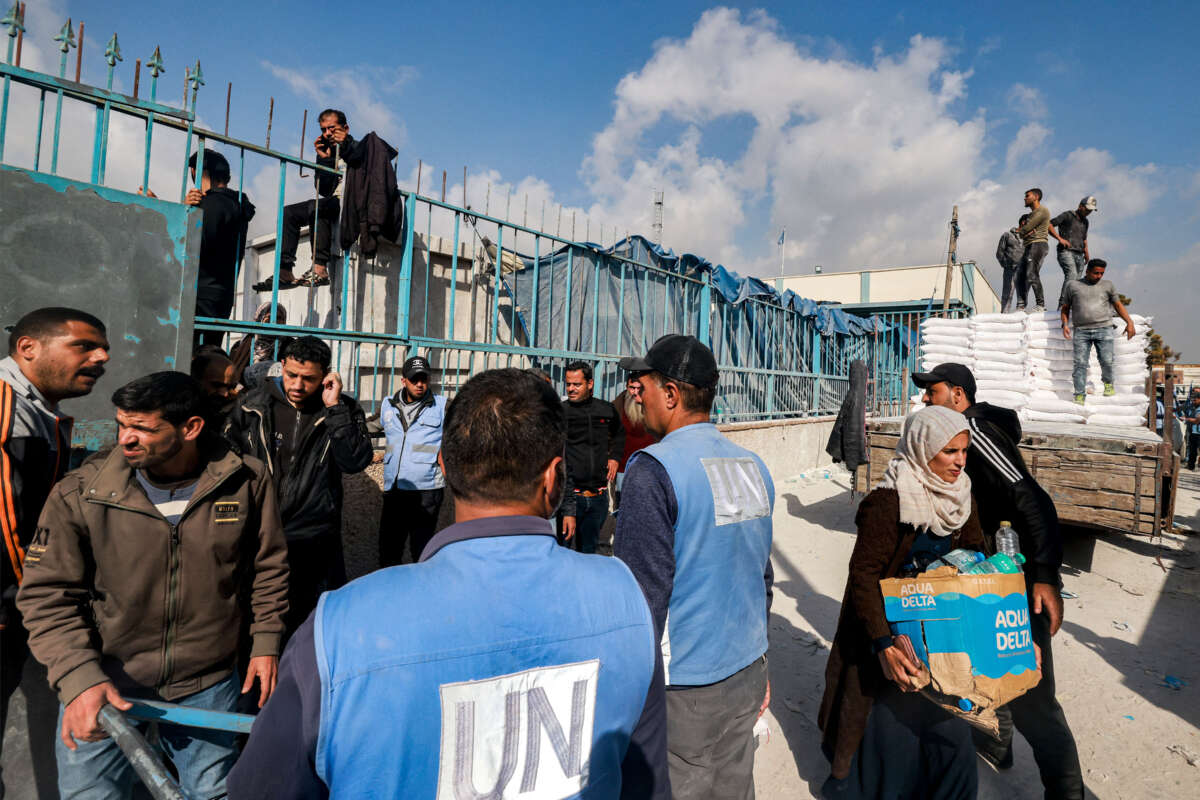Did you know that Truthout is a nonprofit and independently funded by readers like you? If you value what we do, please support our work with a donation.
Nearly a dozen countries have suspended funding to the group primarily responsible for providing humanitarian aid to Palestinians, the UN Relief and Works Agency for Palestinian Refugees (UNRWA), at a time when Israel’s blockade of humanitarian aid and genocidal military campaign is threatening the life of every Palestinian in Gaza.
As of Sunday, at least 10 countries had suspended funding for the group following the U.S.’s suspension on Friday, which was announced shortly after the International Court of Justice (ICJ) issued an initial ruling finding that South Africa has presented a “plausible” case that Israel is committing genocide in Gaza and ordered Israel to take steps to prevent further killings. U.S. officials cited Israeli officials’ accusations that about a dozen UNRWA workers — out of 30,000 across the organization — were involved in the October 7 Hamas attack.
Officials have provided shifting explanations as to where their information on these allegations originated; notably, Israeli forces have repeatedly attacked UNRWA personnel and facilities in the past months, and appear to be using their blockade of humanitarian aid as part of their campaign to cleanse Palestinians from Gaza.
The UN swiftly terminated the staff named in the allegations. And yet, the accusations, however flimsy, have been used as the foundation for countries responsible for over half of the UNRWA’s funding to pull out, even as humanitarian assistance is needed more than ever in Gaza.
Israel is not just killing Palestinians through relentless bombings, but also through its blockade of food, water, electricity and other crucial supplies, leaving the population of Gaza facing widespread disease, hunger and famine. Aid trucks are lined up at the border to enter Gaza, but Israel has been blocking the vast majority of them from entering, even as humanitarian groups issue pleas for Israeli officials to let them through to save countless lives.
“We used to say Israel was launching a war of famine against us in parallel to its war of destruction, now those countries who suspended the aid to UNRWA declared themselves partners in this war, and collective punishment,” Yamen Hamad, a Palestinian who was forced to flee northern Gaza and take shelter in a UN-run school in central Gaza, told Reuters.
The U.S. is one of the UNRWA’s single largest donors, having given the agency nearly $350 million of the $1.2 billion in contributions it received in 2022, as Al Jazeera noted. The other countries that have pulled out so far — Australia, Canada, Estonia, Finland, Germany, Italy, Japan, the Netherlands, Switzerland and the U.K. — were also responsible for more than $350 million of the UNRWA’s funding in 2022.
The chief of the UNRWA, Phillippe Lazzarini, said that the suspensions are tantamount to “collective punishment” of Palestinians.
“These decisions threaten our ongoing humanitarian work across the region including and especially in the Gaza Strip,” Lazzarini said in a statement on Saturday, warning that the agency’s operations in Gaza may come to an end as a result of the suspensions. The funding suspension has left the UNRWA in dire straits, with only weeks left before it runs out of money, former UNRWA spokesperson Chris Gunness told Al Jazeera, and the agency has issued a call for donations.
“The only way that [Israel can follow ICJ orders] is through cooperation with international partners, especially UNRWA as the largest humanitarian actor in Gaza,” Lazzarini continued. “It would be immensely irresponsible to sanction an Agency and an entire community it serves because of allegations of criminal acts against some individuals, especially at a time of war, displacement and political crises in the region.”
U.S. Rep. Alexandria Ocasio-Cortez (D-New York) has called on the U.S. to reverse its suspension of UNRWA funding.“Cutting off support to UNRWA — the primary source of humanitarian aid to 2 million+ Gazans — is unacceptable,” she said. “Among an organization of 13,000 UN aid workers, risking the starvation of millions over grave allegations of 12 is indefensible. The U.S. should restore aid immediately.”
Media that fights fascism
Truthout is funded almost entirely by readers — that’s why we can speak truth to power and cut against the mainstream narrative. But independent journalists at Truthout face mounting political repression under Trump.
We rely on your support to survive McCarthyist censorship. Please make a tax-deductible one-time or monthly donation.
